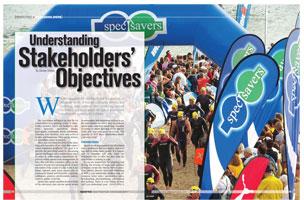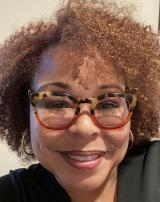
We are measured by excellence, not the average, in whatever we do. If you are constantly refining and nurturing your passion and stretching towards excellence, you are probably the type of person who would polish a pearl until it shines.
 Are you always willing to go that far for stakeholders in a sporting event? A stakeholder includes, but is not limited to, athletes, sponsors, spectators, media, participants, community, hotels, restaurants, charities, host families, civic and political leaders, and businesses. They can be primary or secondary, active or passive.
Are you always willing to go that far for stakeholders in a sporting event? A stakeholder includes, but is not limited to, athletes, sponsors, spectators, media, participants, community, hotels, restaurants, charities, host families, civic and political leaders, and businesses. They can be primary or secondary, active or passive.
Have you ever been involved in the planning and execution of an event that experienced numerous problems? My goal is to provide the proverbial assist by discussing special challenges and considerations when it comes to understanding stakeholder objectives within sports event management. In turn, this will have a positive affect on the success of your next sporting event. It does not matter if the scope of your event is national, regional, state, local, county, city- or community-based, not-for profit, corporate, collegiate, amateur, professional, indoor, outdoor, public or private.
Sports fans spend countless hours in front of the television; they devour sports stories in newspapers and magazines looking to get the story-behind-the-story; they are glued to sports radio; and they spend large amounts of money to attend sporting events that include pre- and post-game activities. The question is: Will these stakeholders attend your next event?
Considerations
Sports event management has developed into a profession that is complex, demanding, and in some cases, global. It is important to consider not only what the stakeholder has to offer, but also what the stakeholder is seeking to gain.
If you are responsible for planning and driving the revenue of large-scale national collegiate events like Shawn McGee (associate athletic director Sales and Marketing at SMU), your stakeholder products may encompass ticket sales, sponsorship sales, broadcasting, merchandising, concessions and parking. There is a lot riding on how well you understand your relationship to each of these. McGee says that when there are multiple stakeholders, "You just try to look for those types of events that make sense to all parties involved."
Communication
It is imperative to build strong communications to define the full scope of the event and to formulate an exhaustive plan of action. This will determine the difference between an average event and a stellar one.
You must communicate as often, and as thoroughly, as possible. Do not dismiss the many meetings you may have scheduled as frivolous. Meetings give you the opportunity to glean ideas and information from others - use them as a chance to listen, learn, and understand what your stakeholders are trying to tell you. Open communication is the key to determining objectives, goals, real and perceived challenges, what is important, what is not important, and how to map guidelines to measure success.
"I always enjoy coming in at the beginning of a project. When they say, 'Chaney, what do you think?' You're not really stepping on anyone's toes because nothing has been established." Chaney Muench, an independent contractor and consultant,uses that time to bring a myriad of concerns and ideas to the table, as should you.
 When problems and challenges occur, correct them quickly with open communications. The good news is that some things are simple to fix. Some things that are not so easy to fix may take a little more time and resources to be resolved. Muench says one of her biggest challenges is "dealing with different weather conditions" when planning an outdoor event.
When problems and challenges occur, correct them quickly with open communications. The good news is that some things are simple to fix. Some things that are not so easy to fix may take a little more time and resources to be resolved. Muench says one of her biggest challenges is "dealing with different weather conditions" when planning an outdoor event.
Muench also described the ultimate worse-case scenario where the unexpected happened. She was staging an event in downtown Dallas when someone in an unrelated crowd was shot. The incident caused widespread panic. Muench commented, "Now that's bad. It's like the weather. We had plenty of police and tons of security. The only thing you can have at a time like that is a disaster plan and a communication plan. If something happens, who is the point person for that emergency?" How will you answer this question?
What if someone was seriously hurt at, or near, an event that you were staging? How do you keep your stakeholders safe? The unexpected will happen. Be prepared; don't let it take you by surprise.
Sources Worth Tapping
When considering an expansion of an event into a tourism opportunity, involve the local convention and visitors' bureau (CVB). They are a vital connection to the community and the travel and tourism industry. They also have built-in relationships with potential partners, sponsors and other relevant contacts.
Event organizers often go to sports commissions and convention and visitors bureaus for help. A prime example is The Winter Games of Texas, an amateur athletic event organized by the Texas Amateur Athletic Federation (TAAF), Muench, and the Frisco Convention and Visitors Bureau.
TAAF began their search for a host city by polling its members to find member cities that were interested in creating a winter games event, much like their summer games that have been in existence for over 20 years. The City of Frisco knew the financial risk of taking on such an endeavor as creating the games from scratch. However, the event has become a good fit for the city which touts itself as a sports mecca and home to four sports teams. During the Winter Games of Texas, they accommodate and host athletes and their families, coaches, referees, spectators, media, sponsors, marketing partners, volunteers, and more from all over the state.
They have successfully taken the Winter Games concept from its infancy to maturity in Frisco, giving TAAF a marketable event to put up for bid at a later date. It is a fine example of when everything goes right with your stakeholders.
 "What we get in the long run are organizations that continue to partner with us after three years and will continue to partner with us into the future," says Marla Roe, executive director of the Frisco CVB. Whatever you choose to do, wherever you choose to do it, always keep in mind that your event is showcasing its host city and impacting the local economy – yet another important golden rule to understanding stakeholder objectives.
"What we get in the long run are organizations that continue to partner with us after three years and will continue to partner with us into the future," says Marla Roe, executive director of the Frisco CVB. Whatever you choose to do, wherever you choose to do it, always keep in mind that your event is showcasing its host city and impacting the local economy – yet another important golden rule to understanding stakeholder objectives.
Maybe you would like to include your local or state sports commission in an event that you are planning, but don't know anyone within the organization. How do you begin to forge bonds with people that you don't know? Let's use the example set by TAAF.
When TAAF began their search for a host city, they asked their members to recommend cities. Most people in one leadership role are in other leadership roles as well. Start your own networking-to-win campaign by looking within the organizations where you hold a direct or affiliate membership. Ask for introductions. Ask for leads.Ask for advice. Ask for referrals. Don't be afraid to ask for what you want! In time, you will be face-to-face with someone on the sports commission getting your ideas heard.
Stakeholders' Needs
Stakeholders' needs vary. When athletes are your stakeholders, find out if there will be free time available. Do you need to find activities for them within walking distance of their hotel? Restless athletes in a hotel can cause havoc. (Think hockey pucks in a hallway.) What about transportation? An informative itinerary may need to be organized for the athletes to help them navigate their way around town. What about team meals? Does the team like to eat in a group setting or would they prefer to eat on their own? How will you pay for their meals? Will you offer them some sort of discount with local restaurants? Per diem spending for coaches, volunteers and referees should also be considered. These issues need to be addressed in the early planning stages to avoid escalating to frustrating challenges.
Understanding the plan, the goals, any limitations and the personalities of others (most importantly stakeholders) is paramount. Every step of your planning should address primary and secondary effects on each group of stakeholders. Remember: Your primary concern is to address the needs and wants of your stakeholders.
When you deliver what the stakeholder is seeking to gain, not only will you get repeat business, but referrals for new business will come as well. Accountability, inclusiveness, good communication, and mutual respect will enhance your interaction with stakeholders and help create close relationships.
Let's also consider other stakeholders such as spectators and fans who may be attending your next event. They want great pre-game, game time and post-event action and activities. McGee admits he has no control over whether the game will be good, but he can guarantee that you will enjoy the entire game-day experience with "20,000 of your closest friends."
Right now McGee and his staff are analyzing everything about the SMU game-day experience from the moment you set foot on campus until the time you leave. Obtaining direct feedback from surveying is an excellent way to facilitate relationships and understand the objectives of a particular stakeholder. Do better than just 'get along with' your stakeholders; relationships will get you everywhere!
Understanding the Objectives
There are no specific methods to understanding the objectives of your many different stakeholders. Unfortunately it is not an exact science. Suggestions and recommendations can be made, but you will have to make decisions based on your individual relationships with each different stakeholder.
Marla Roe has a few words of wisdom to add, "If you have a vision and want to create an event, think about the full value that the event has on a community and then find a community that can find value back in it." Half the battle is finding a location that works for all stakeholders.
Gale Heubach, events manager for the U.S. Youth Soccer Association, handles player luncheons, air, ground, hotel accommodations, and any other hospitality needs that go with it. She says a big deal for her is to have a good relationship with hotels.
When it comes to the U.S. Youth Soccer ODP National Championships that Heubach manages, it always has to be a good fit between the hotel, the city, and the teams - three different stakeholders with three different objectives. What is her advice for putting together a seamless event? "You have to understand both sides of the coin. Ask yourself what's in it for your stakeholders." Understanding their objectives can put you in the driver's seat and in a leadership role.

